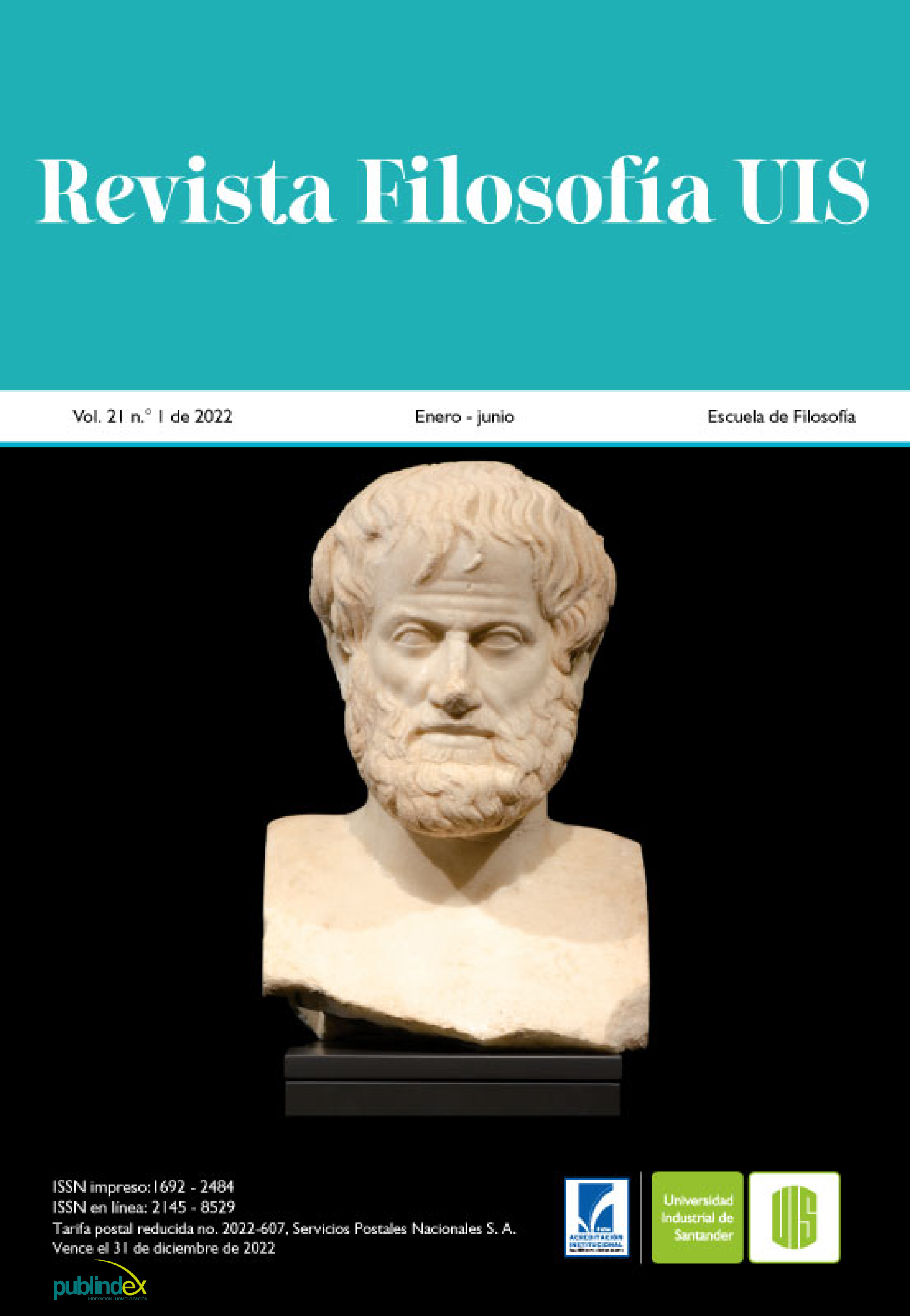Narriting for Brooking Pain. Vulnerability and Need for Consolation from Blumenberg
Published 2022-01-03
Keywords
- consolation,
- delegation,
- vulnerability,
- pain,
- narrating
- Blumenberg ...More
How to Cite
Copyright (c) 2022 Revista Filosofía UIS

This work is licensed under a Creative Commons Attribution 4.0 International License.
Abstract
the narratives served primitive man to establish a distance with the world and face reality. Despite the achieved security, diseases and pain remind him of that stage in which primitive man was exposed to hostile reality. Man finds again in the narrative the possibility of brooking his pain. This paper explores from Blumenberg’s philosophy man’s desire for consolation. Especially how the others are needed to attend to the pain. For this reason, the text is divided into three parts. In the first, it shows how primitive man manages to free himself from the absolutism of reality. In the second, it exposes man’s need for consolation and how he can delegate his pain to others. In the third, it explores how despite the difficulty in narrating of pain, men find a possibility to do it through metaphorical language.
Downloads
References
- Aristóteles (1974). Poética. (V. García Yebra, trad.). Gredos.
- Blumenberg, H. (1999). Una aproximación antropológica a la actualidad de la retórica. En Las realidades en que vivimos. (P. Madrigal, trad.) (pp. 115-142). Paidós.
- Blumenberg, H. (2003a). Trabajo sobre el mito. (P. Madrigal, trad.). Paidós.
- Blumenberg, H. (2003b). Paradigmas para una metaforología (J. Pérez de Tudela Velasco, trad.). Trotta.
- Blumenberg, H. (2010). Conceptos en historias. (C. Cantón y D. Innenarity, trads.). Síntesis.
- Blumenberg, H. (2011). Contingencia y visibilidad. En Descripción de ser humano. (G. Mársico, trad.) (pp. 357-669). Fondo de Cultura Económica.
- Butler, J. (2006). Vida precaria: el poder del duelo y la violencia. (R. Fermín, trad.). Paidós.
- Butler, J. (2010). Vida precaria, vida digna de duelo. En Marcos de Guerra. Las vidas lloradas. (B. Moreno, trad.) (pp. 13-56). Paidós.
- Cardona, L. (2019). El sufrimiento humano como pauta ética. Rev. Fac. Nac. Salud Pública, 37, 55-63. https://revistas.udea.edu.co/index.php/fnsp/article/view/339735
- Cardona, L. (2020). Enfermedad y metáfora. Pensamiento. Revista De Investigación E Información Filosófica, 76(288), 89-111. https://doi.org/10.14422/pen.v76.i288.y2020.005
- Chamorro, A. (2020). Curar y enfermar: apuntes sobre la filosofía de la enfermedad. Revista Filosofía UIS, 19(2), 12-20. https://revistas.uis.edu.co/index.php/revistafilosofiauis/article/view/10871/10936
- González, S. (2008). Encarar lo real: caos, fantasía y trabajo. Sobre Hans Blumenberg. Universitas Philosophica, 25(51), 17-39. https://revistas.javeriana.edu.co/index.php/vniphilosophica/article/view/11192
- Kant, E. (1992). Crítica de la facultad para juzgar. (T. Oyarzún, trad.). Monte Ávila Editores.
- Losada, E. (2019). El papel de las metáforas en las experiencias de dolor. Diálogos, (104), 63-77. https://revistas.upr.edu/index.php/dialogos/article/view/16614
- Mumbrú, A. (2012). El concepto de exposición simbólica en Kant. Éndoxa, 1(29), 45-72. https://doi.org/10.5944/endoxa.29.2012.5310
- Ortega y Gasset, G. (1963). Las dos grandes metáforas. En Obras completas II (pp. 387-400). Revista de Occidente.
- Peiró, E. (2016). El absolutismo de la realidad: un concepto problemático en la obra de Blumenberg. Contrastes. Revista Internacional de Filosofía, 21(1), 113-128. https://doi.org/10.24310/Contrastescontrastes.v21i1.2311
- Rivera, A. (2010a). Hans Blumenberg: mito, metáfora absoluta y filosofía política. Ingenium. Revista Electrónica De Pensamiento Moderno Y Metodología En Historia De Las Ideas, (4), 145-165. https://revistas.ucm.es/index.php/INGE/article/view/INGE1010220145A
- Rivera, A. (2010b). Reflexiones sobre el concepto filosófico de absolutismo: retórica y mito en Blumenberg. En Hans Blumenberg. Nuovi paradigmi d’analisi, (pp. 143-165). Aracne Editrice.
- Shklar, J. (2013). Desventura e injusticia. En Los rostros de la injusticia (A. García, trad.) (pp. 97-140). Herder.
- Sontag, S. (2003). La enfermedad y sus metáforas. El sida y sus metáforas. (M. Muchnik, trad.). Taurus.

